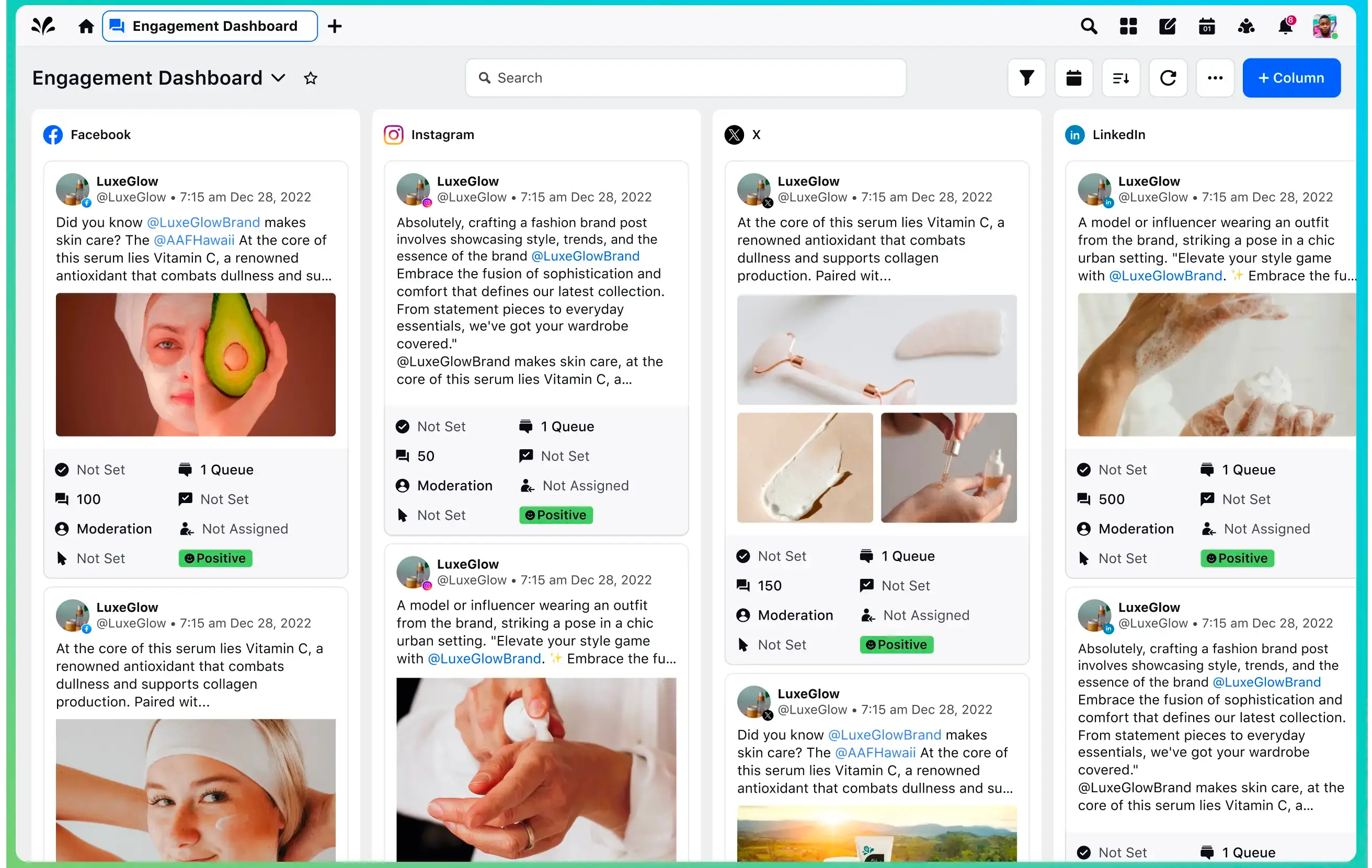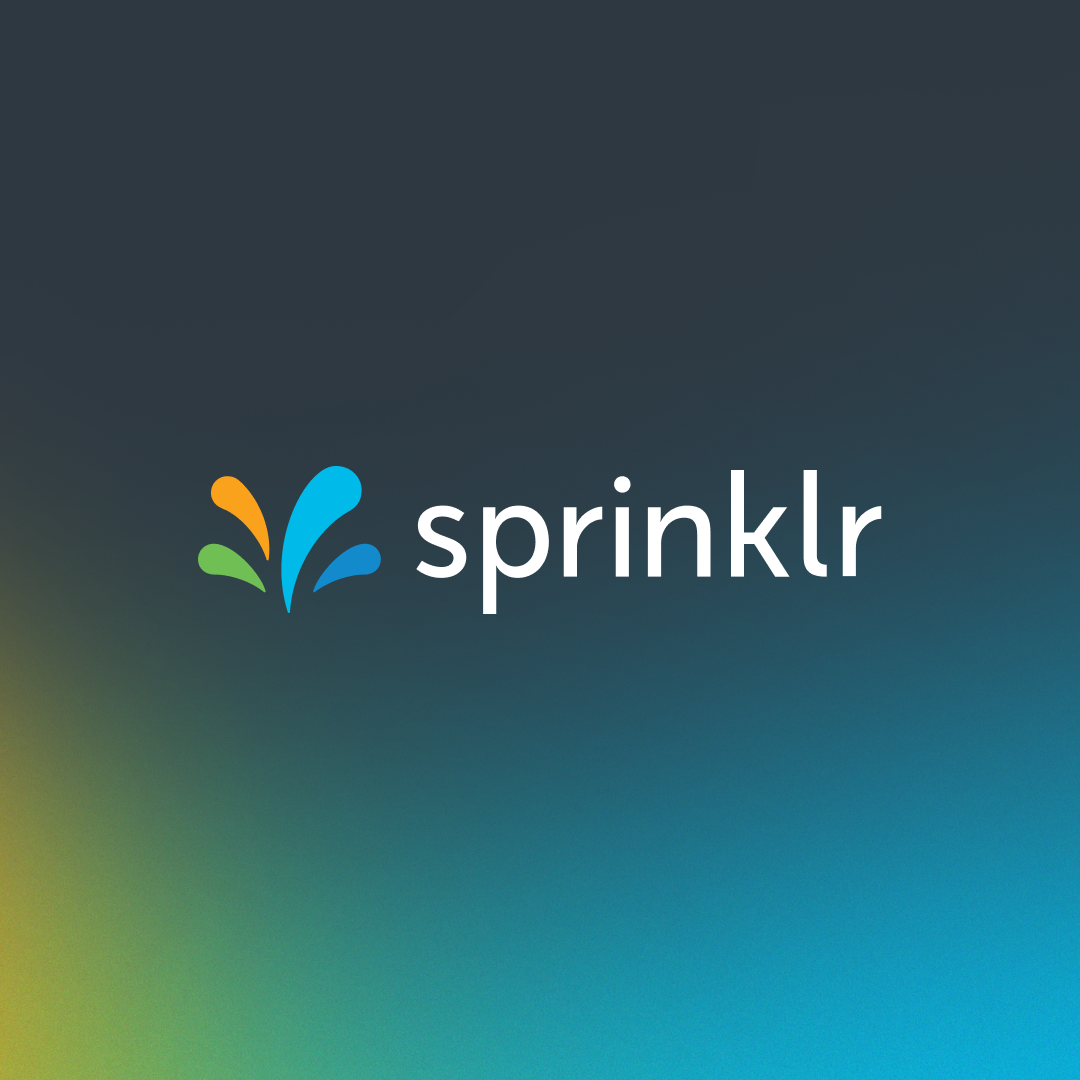The undisputed leader in social media management
For over a decade, the world’s largest enterprises have trusted Sprinklr Social for its in-depth listening, unmatched channel coverage, enterprise-grade configurability and industry-defining AI.

Advantages and Disadvantages of Social Media Marketing
More than half the world’s population use social media to share their lives, passions and interests. This presents a huge opportunity for businesses to connect and engage with their customers and ultimately make the most of this channel.
Why is social media marketing important?
Businesses are gradually moving away from traditional advertising methods and embracing a more interactive, dynamic, and customer-centric approach through social media marketing. This change has revolutionized how brands reach out to their target audience.
The true magic of social media marketing lies in its capacity to reach millions of customers with a single post — first by capturing their attention and then transforming them into followers and eventually customers. In fact, research indicates that 76% of consumers make purchasing decisions after encountering a product-related post on social media platforms.
Are you behind in the social selling race?
Check out 10 Social Media Lead Generation Tactics [with Examples]
On average, individuals spend over 2 hours and 29 minutes browsing social media. This emphasizes the need for businesses to establish a presence on these platforms so as to form meaningful connections with consumers.
But, like any marketing strategy, social media marketing also has its pros and cons.
So, let's dive in and explore its advantages and disadvantages.
Advantages of social media marketing
Let’s begin with the advantages of social media marketing.
1. Cost-effective advertising
Social media platforms like Facebook, Instagram, X, YouTube and LinkedIn provide affordable advertising options to reach out to a wider audience. With features like targeted social media advertising, you can make the most of your marketing dollars and achieve a higher return on investment (ROI).
💱What’s the ROI of your social media efforts?
Measuring social media marketing ROI becomes easy with an AI-powered analytics and reporting tool that objectively calibrates your brand’s performance against key marketing metrics. Plus, it should also indicate:
- Your most liked and effective campaigns/content
- How you stack up against the competition
- Areas of improvement in your social media strategy

Want to get a tour of Sprinklr's analytics capabilities and remove the guesswork from your marketing efforts?
2. Building brand loyalty
Social media platforms help you better engage with your customers. You can make them feel heard by responding to their comments and addressing their concerns promptly. This helps in building trust and creating a sense of community When your consumers feel valued, they will turn into brand advocates and spread positive word-of-mouth recommendations.
Also Read: How to Build an Online Customer Community (+Benefits)
3. Influencer partnerships
Today, more than 50% of millennials trust influencers’ product recommendations. By partnering with influencers who align with your brand values, you can leverage their credibility to promote your products or services. This will help boost brand visibility and potential customer acquisition.
Pro Tip: Leverage micro-influencers in your niche for higher engagement rates. Their smaller, more dedicated audiences often yield better ROI than their mega-influencer counterparts. Here are some resources to get you started:
4. Audience insights and market research
Social media platforms provide valuable insights into audience demographics, interests and behavior. In fact, more than 64% of business owners use social media data to gather insights into their customer's requirements and online behavior.
By analyzing social media data businesses can gain a deeper understanding of their target audience, identify emerging trends and stay ahead of the competition. These insights can be used to tailor marketing campaigns and develop products or services that cater to specific needs.
Dive Deeper: Top 7 Social Media Analytics Tools [Best Rated 2025]
5. Viral marketing opportunities
Social media has the power to make your content go viral and help you reach a massive audience within a short time. Through creative campaigns, compelling storytelling and user-generated content, you can increase your chances of creating viral marketing moments, leading to exponential growth in brand awareness and engagement.
Want to create viral content for social media?
Try:
- Implementing Best Practices for Social Media Challenges
- Leveraging User-generated Content Marketing
6. Enhanced customer targeting and segmentation
Social media platforms enable businesses to segment their audience and target specific customer segments with tailored social media messaging. By understanding the different needs, preferences and behaviors of various customer segments, you can create customized social media content that resonates with each group. This increases customer engagement, enhances their overall experience and increases conversions.
7. Access to user-generated content
Social media platforms offer a wealth of user-generated content that can be harnessed by businesses. Showcasing customer photos, sharing positive reviews and running user-generated content campaigns can build trust, credibility and authenticity.
Don’t you also want to create high-converting user-generated content?
Here’s your must-read: How to Leverage UGC to Drive Engagement & Conversions on Social Media
8. Competitive advantage
A strong social media presence gives your business a competitive edge. By actively engaging with customers, providing timely responses and staying up-to-date on the latest industry trends, companies can position themselves as industry leaders.
👉 3 key aspects of social media competitive benchmarking
#1 Innovative content exploration 📝
Analyze competitors for experimental or innovative content types they might be trying out, such as new social media features (e.g., Instagram Reels, X, Spaces) that your brand hasn't utilized yet.
#2 Influence of partnerships 👐
Examine the impact of your competitors’ partnerships or collaborations on engagement and reach. Replicating successful partnerships can inspire success.
#3 Long-term performance trends 🏆
Assess the consistency and sustainability of competitors' performance over extended periods rather than just short-term spikes or campaign wins. This can help identify enduring strategies that produce stable growth.
9. Global reach and localization
Social media breaks down geographical barriers, enabling businesses to reach a global audience. These platforms also offer localization options, allowing your company to target specific regions, languages or cultural nuances.
Although social media marketing is of great strategic importance, it also has some pitfalls that a business should always keep in mind.
Simply avoiding pitfalls isn't enough: Master the evolving landscape with our The State of Social Media Marketing in 2024 eBook!
Disadvantages of social media marketing
Now, let's discuss some of the cons of social media marketing.
1. Time and resource intensive
Maintaining an effective social media presence requires a significant investment of time and resources. Creating and curating engaging content, managing multiple social media platforms, maintaining a consistent brand experience and responding to customer inquiries demand continuous effort and a dedicated team. Without proper planning and allocation of resources, social media marketing efforts can become overwhelming and less effective and lead to a dip in the quality of the content.
2. Negative feedback and reputation management
Negative comments or reviews can quickly spread across social media platforms, potentially damaging a company's reputation. A single negative incident or social media backlash can significantly impact a company's reputation. Effective social media crisis management and proactive reputation monitoring are vital to managing the impact of negative viral content.
Worth reading: 5 Best Examples of Social Media Crisis Management
3. Changes in platform algorithm
Social media platforms frequently update their algorithms, affecting the reach and visibility of organic content. These social media algorithm changes can significantly impact a business's social media strategy. You must stay updated on platform changes and adjust your approach to maintain visibility and engagement with your audience.
4. Information overload and limited attention span
With users scrolling through endless posts, it becomes crucial for businesses to create compelling and visually appealing content that can cut through the noise. An internet user, on average, is bombarded with almost 4,000 and 10,000 ads every day. Due to this, your social media marketing efforts can lead to little returns because it is becoming increasingly difficult to capture a user's attention.
🚫Avoid spamming your audience by scheduling your content smartly
Today, there are advanced social media schedulers (such as Sprinklr) that allow you to queue posts smartly, ensuring:
- Smooth scheduling: Precisely time your posts across multiple platforms to keep your audience engaged without feeling bombarded.
- Effortless coordination: Organize your social media calendar from one dashboard, making it easy to align team efforts and streamline content delivery.
- Targeted posts and increased engagement: Use strategic timing and analytics to engage your audience at the right moments, optimizing reach and interaction.
Curious? Hit the button below.
5. Return on investment measurement
While social media platforms offer analytics tools to track metrics, such as engagement, reach and website traffic tying these metrics directly to revenue generation can be challenging. Attribution models and tracking mechanisms must be implemented to accurately evaluate the impact of marketing on your social media goals.
6. Social media privacy and data security concerns
Social media platforms collect vast amounts of user data, raising privacy and data security concerns. You must handle and use this data responsibly. Any misuse of consumer data can lead to your company facing legal consequences. This can damage its reputation, which might take years to rebuild. Now, let's take a look at some fascinating case studies to understand how some of the most successful businesses harness social media marketing.
Real-world case studies
Here are a few interesting case studies that have set a benchmark in social media marketing.
Case study 1: Dove
Dove's "Real Beauty" campaign is a groundbreaking social media marketing campaign. Through thought-provoking videos and messages that challenge conventional beauty standards, the popular personal care brand has created a movement that celebrates diversity and promotes body positivity.
The campaign drove important conversations surrounding beauty standards on social media, with the hashtag #RealBeauty gaining significant traction. Dove promoted authenticity and inclusivity, which resonated with its audience and turned them into loyalists. The outcome:
- Increase in video views: The "Dove Real Beauty Sketches" video alone accumulated over 180 million views on YouTube
- Awards and recognition: The campaign became the recipient of numerous industry awards, including the famed Cannes Lions International Festival of Creativity
- Positive brand perception: Studies show that the campaign significantly improved consumers' perception of Dove, enhancing brand favorability and purchase intent
Case study 2: Coca-Cola
Coca-Cola's social media marketing efforts have consistently been at the forefront of innovative campaigns. One notable campaign was its "Share a Coke" campaign, where personalized Coke bottles with people's names were introduced.
Coca-Cola encouraged consumers to find and share their personalized bottles on social media using the hashtag #ShareACoke. This campaign generated a massive amount of user-generated content and increased engagement, increasing its sales by 2.5% during this period. The outcome:
- User-generated content: Over 500,000 photos featuring personalized Coke bottles were shared on social media
- Social media mentions: The campaign generated over 1.2 million tweets with the hashtag #ShareACoke.
- Brand sentiment: 7 out of 10 people felt more positive about the brand due to the campaign
Case study 3: Chick-fil-A
Chick-fil-A, the popular fast food chain, faced a significant challenge when they removed the Smokehouse BBQ Sauce from their menu. This triggered a wave of customer disappointment, with many expressing their desire for its return on social media platforms.
Chick-fil-A needed to address these vocal demands and find a way to appease their passionate customer base. Thus, the brand put together the #BringBackTheBBQ campaign. It monitored and analyzed customer sentiment across social media platforms to understand the depth of attachment customers had to the sauce. With the customer-centric approach of Sprinklr, Chick-fil-A effectively utilized social listening, direct engagement and customer-generated content to revitalize a beloved menu item. The outcome:
- Increased customer satisfaction and loyalty: Responsive listening and addressing customer demands led to higher satisfaction and improved loyalty among Chick-fil-A's customer base
- High engagement on social media: The campaign generated significant engagement on social media platforms, with thousands of mentions, comments and shares related to the #BringBackTheBBQ campaign
- Reinforced customer-centric brand image: The campaign showcased Chick-fil-A's commitment to take customer feedback seriously, reinforcing its brand image as customer-centric and responsive to its audience
Wrapping up
In conclusion, social media marketing opens doors to cost-effective and impactful opportunities for businesses to expand their reach, build brand loyalty and gain valuable customer insights. By embracing the potential of social media marketing, you can create meaningful connections, amplify your brand presence and unlock remarkable growth. But how can your business execute its social media marketing plans seamlessly?
That's where a comprehensive social media management platform like Sprinklr Social comes in. With its AI-powered capabilities, Sprinklr empowers businesses to actively listen, engage and analyze data, fueling successful marketing campaigns. Ready to smoothen your social media journey with Sprinklr?




